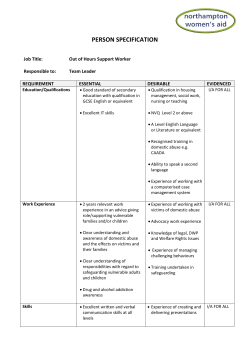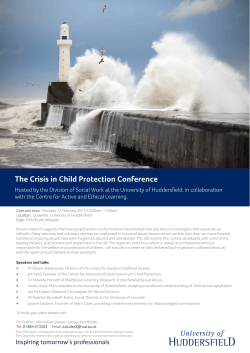
LSCB Training Brochure - Luton Safeguarding Children Board
Luton Safeguarding Children Board Multi-Agency Training Brochure 2015-16 In partnership with Contents Content Content Page No Multi Agency Courses Page No Contact Us 4 Protecting Disabled Children 9 Introduction to Training 4 Professional Challenge 9 LSCB Website 10 Trauma, Abuse & the Brain 10 Understanding Self Harm 11 Working with Difficult, Dangerous & Evasive Families 12 WRAP: Safeguarding Children from Radicalisation & Extremism 12 Multi Agency Courses Page No Introduction to Safeguarding Children 5 Safeguarding Children: A Shared Responsibility 5 Analysis in the Assessment Process 6 Other Training Child Sexual Exploitation: Are you Colluding with Silence 6 Child Sexual Exploitation Panel (CSEP) 7 Nature & Impact of Sexual Abuse: Thinking the Unthinkable 7 In Our Shoes: Evidencing the Children Journey & Experience 8 Keeping Children Safe Online 8 3 Page No Train the Trainer 14 Training in your Organisation 14 Contact Us Training The Safeguarding Learning and Development Team details can be found below: The Luton Safeguarding Children Board (LSCB) training programme has been developed to support the ethos that safeguarding is everyone's responsibility. Christine Langley Senior Learning & Development Officer Fran Hill The courses are open to workers within agencies in Luton who work with children, young people and/or adults that have parental responsibilities. Learning & Development Officer Sheelagh Goonan Learning & Development Officer Mark Golby Assistant Learning & Development Officer Sinead Doyle Assistant Learning & Development Officer The programme is delivered on a multi agency basis, providing front line practitioners across Luton , opportunities to train and network with other local professionals, helping to create a clearer picture of the services and resources available to assist their client groups. The programme is delivered using a pool of multi agency trainers, who provide their time and expertise for free, as well as external trainers and expert speakers commissioned for particular topics. Without the help and support of these individuals we would not be able deliver this programme, so a massive thank you to all our trainers and subject contributors. You really do make a difference for the children and young people of Luton. If you have any enquiries or comments about the programme, please contact the Learning and Development Team on 01582 547555 or 547349, alternatively you can e-mail us at learninganddevelopment@luton.gov.uk For non training related LSCB enquiries please contact the LSCB directly on 01582 547624 or alternatively you can e-mail us at safeguarding@luton.gov.uk 4 Introduction to Safeguarding Children Safeguarding Children: A Shared Responsibility Aim: Aim: To develop awareness of, and the ability to act on concerns about, the safety and welfare of children and young people. To develop skills to recognise potential abuse or neglect and take appropriate action in reporting suspected or known abuse. Learning Outcomes: Learning Outcomes: By the end of this course, delegates will be able to: By the end of this course delegates will be able to: dismantle the myths associated with child abuse and the process of safeguarding children understand the basic legislative framework for safeguarding children define child abuse and neglect understand their safeguarding role and responsibilities recognise the signs and indicators that may raise child protection concerns define child abuse and neglect demonstrate an awareness of the legislative framework and local procedures as they relate to safeguarding children identify potential barriers preventing children from reporting abuse appreciate their role and responsibilities in relation to sharing information, referring and recording child protection concerns understand when and how to share information identify possible indicators of abuse and neglect describe what to do if they have concerns over the welfare of a child. engage in “working together” with other agencies by networking and sharing information as appropriate Please note that this course is only open to Private, Voluntary and Independent agencies. Employees from statutory organisations should contact their Learning & Development departments Dates: Dates: Dates: 19th June 2015 30th Apr & 1st May 2015 27th & 28th Oct 2015 14th Sept 2015 3rd & 4th June 2015 8th & 9th Dec 2015 25th Nov 2015 17th & 18th Sept 2015 21st & 22nd March 2016 25th Feb 2016 5 Analysis in the Assessment Process Child Sexual Exploitation: Are you Colluding with Silence ? Aim: Aim: To demonstrate what should be done at different stages of the analysis and assessment process in order to increase delegate’s abilities and confidence in safeguarding the children they are working with. Learning Outcomes: To equip all those professionals working with children, young people and adults who have parenting responsibilities, with the assessment skills and knowledge in identifying risk indicators related to the grooming and sexual exploitation of children and young people. By the end of the programme delegates will be able to: Learning Outcomes: critically review current assessment practices By the end of the course delegates will be able to: effectively involve children and parents in the assessment process develop and apply a working definition of sexual exploitation explain the value and use of evidence based practice recognise signs and indications of a child at risk of sexual exploitation understand the concept of professional judgement and how it can be used enhance their understanding of the impact of sexual exploitation apply models designed to assess; the resilience of the child, the protective environment, the risk and the planning process. identify strategies to promote resilience and address risk of sexual exploitation in a multi agency setting. Dates: Dates: 1st July 2015 14th May 2015 8th March 2015 18th Sept 2015 16th Dec 2015 3rd March 2016 6 Child Sexual Exploitation Panel (CSEP) The Nature and Impact of Sexual Abuse: Thinking the Unthinkable Sexual exploitation is a growing area of concern facing today’s children and young people. Aim: To increase knowledge and understanding of the nature and impact of child sexual abuse. CSEP is a multi-agency risk assessment panel for workers to present cases where they know or suspect a child at risk or is suffering from sexual exploitation. Learning Outcomes: By the end of this course, delegates will be able to: The aim of the panel is to develop a risk management plan that provides professional support to all those at risk and is aimed at reducing the risk of harm. develop a working definition of sexual abuse understand the range of abuser motivations and behaviours using 'Finklehor's model' of sexual offending Aim: recognise and raise awareness of the grooming of children, carers and professionals To gain an understanding of CSEP, its protocol and how to use it. Learning Outcomes: give a range of examples of signs and indicators of child sexual abuse By the end of this session delegates will be able to: work within the CSEP protocol to identify cases with low, medium or high risk describe short and long term effects of sexual abuse on children feel more confident about individual roles and responsibilities and appropriate responses in a multi agency setting. understand the referral process CSEP make referrals to CSEP using the correct process contribute to the multi-agency response Dates: Dates: Dates: 28th April 2015 (pm) 2nd Dec 2015 (am) 18th & 19th June 2015 25th June 2015 (am) 9th Feb 2016 (pm) 8th & 9th Oct 2015 20th Oct 2015 (pm) 7 In Our Shoes - Evidencing the Child’s Journey & Experiences Keeping Children Safe Online The impact of the child’s voice and their experience of services are now clear criteria for Ofsted in judging the effectiveness and quality of practice. The internet and online technologies are an important part of children’s lives at home & at school but also present a challenge to keeping children safe. Aim: Aim: To ensure that all front line practitioners and their managers are able to evidence their engagement with children and families and show how this has shaped planning and influenced the outcomes for the child at each step of their journey. To demystify the use of online technologies used by children and provide guidance on how to keep them safe when they’re online. Learning Outcome: This session will look at the practical steps that can be put in place to protect children online and will cover issues children face from early years to teenagers, and will include: Learning Outcome: By the end of the course delegates will: have a better understanding of the experience of children in care and those leaving care remember what it was to be a child and use this process to reflect on practice unwanted contact - keeping personal information safe, avoiding unwanted contact, how online offenders operate, what do to is someone makes a child feel uncomfortable demonstrate an improvement in their assessment and care planning skills cyber bullying - what is cyber bullying, how it is different from playground bullying, legal consequences taking & sending images - what is sexting, what to do if you a child receives an image, legal implications Dates: Dates: Dates: 2nd June 2015 27th Apr 2015 (am) 16th Oct 2015 (pm) 13th October 2015 5th June 2015 (am) 11th Dec 2015 (pm) 13th Aug 2015 (evening) 26th Feb 2016 (am) 8 Professional Challenge How to Make Friends & Influence People Protecting Disabled Children Aim: Aim: To help participants consider the specific needs of children with disabilities when responding to allegations, undertaking investigations and other formal procedures. To give staff the skills and confidence to appropriately challenge safeguarding decisions made by other Professionals. Learning Outcomes: Learning Outcomes: By the end of the sessions delegates will; By the end of the course delegates will be able to: understand the context of care for disabled children. understand the importance of their role and responsibilities in relation to others reflect the impact of social attitudes on the provision of services to this group. understand the qualities and elements of effective persuasion and influence understand the barriers to effectively safeguarding disabled children. understand the appropriate pathways to gaining influence have increased personal confidence in gathering and presenting evidence devise ways to ensure these children have a voice in the provision of services. have an opportunity to practice skills in persuasion and influencing others. use different communication strategies that support the disabled child’s right to be heard. Dates: Dates: 13th May 2015 TBC 12th Nov 2015 9 Trauma Abuse & the Brain: The Impact & Implication for a Child’s Emotional Development LSCB Website Aim: Don’t forget to check out the Luton Safeguarding Children Board website, www.lutonlscb.org.uk To raise awareness of the effects and consequences of poor nurturing on the developing brain. Here you will find information , advice and guidance on the below topics: Learning Outcomes: How to report Abuse understand normal neurological development in a good nurturing environment Channel Child Sexual Exploitation understand the differences between a good and a poor nurturing environment Child Death Overview Process Allegations against adults working with Children & Young People identify the effects of a poor nurturing Safer Recruitment environment on the developing brain Safeguarding in the Voluntary Sector consider what we can do to help traumatised children E-Safety plan how we can safeguard children in similar circumstances. Learning and Improvement Framework Private Fostering News and Events Inter-Agency Safeguarding Procedures By the end of the course delegates will be able to: explain how experiences change the shape of the brain Dates: 17th July 2015 19th November 2015 10 Understanding Self Harm in Children & Young People Understanding Self Harm in Children & Young People, cont... demonstrate increased confidence in their ability to offer a helpful support and advice to a child/young person who selfharms Aim: To aid understanding and awareness of children and young people who self harm and how to effectively respond. Demonstrate increased confidence in offering support to the parents/carers of children/young people who self harm Learning Outcomes: describe how the emotional impact of self-harm on staff/carers & how this can affect the quality of support offered & the impact on the staff/carer’s own mental well-being By the end of the course delegates will be able to demonstrate an understanding of self-harm as a coping strategy to deal with difficult feelings & situations access current research, publications and resources around self-harm construct a definition of self-harm and it’s relationship with other harming behaviour including suicide reflect on how language and terminology will impact on the responses given to a child/young person demonstrate an understanding of the social, environmental and psychological factors of self-harm demonstrate an increased awareness of the functions that selfharm maybe serving for the child/young person identify & address the barriers to disclosures & accessing support demonstrate increased awareness of responses that will help to reduce risk & promoting therapeutic relationships Dates: demonstrate increased confidence in broaching the issue of self-harm 15th Sept 2015 15th June 2015 20th Jan 2016 11 Working with Difficult, Dangerous and Evasive Families Workshop to Raise Awareness of Prevent (WRAP) This course focuses on the critical dynamic between worker & service user, particularly when concerns about child protection need to be raised. Aim: To safeguard children and young people by developing awareness, understanding and recognition of extremism and radicalisation. Aim: Learning Outcomes: To promote skills development for working with challenging & difficult parents, exploring the concepts of disguised compliance and evasive behaviour. By the end of this course, delegates will be able to: have an increased awareness of the issues relating to all forms of extremism Learning Outcome: The training covers a range of practice issues which include: have an understanding of the local context an overview of research and current SCRs have the skills to recognise those who are potentially vulnerable to all forms of extremism definitions of difficult, dangerous and evasive service users the child's voice have a clear understanding of the local safeguarding referral process as set out in the vulnerable to radicalisation protocol for children and young people reflective practice a model of communication scrutiny of practice strategies for working with evasive families self-care and utilising support systems Dates: Dates: 11th May 2015 30th June 2015 (am) 25th Sept 2015 15th Oct 2015 (pm) 23rd Feb 2016 (am) 12 E - Learning Charges for Training The LSCB training programme is funded by contributions from LSCB Partners including Bedfordshire Police, Luton NHS Trust, Luton Clinical Commissioning Group and Luton Borough Council. The Luton LSCB e-learning training programme is provided by Virtual College’s Safeguarding Children e-Academy. Our current course selection includes Partner agencies that contribute to the budget can attend courses free of charge. Awareness of Child Abuse and Neglect An Introduction to FGM, Forced Marriage, Spirit Possession and Honour Based Violence Information Sharing Safeguarding Children from Abuse by Sexual Exploitation Safeguarding Children with Disabilities Other agencies, including schools, early year providers, academies and profit making organisations will be charged to attend courses. Safer Working Practices How much does training cost: Charities and Non Profit organisation (subject to receipt of their charity registration number or registered company number) are also able to attend free of charge. Access Users can only access the safeguarding e-learning platform with a username and password issued by Luton LSCB. All requests to access the platform must be made via the Safeguarding Learning & Development team. Learners will receive e-mail confirmation of their username and password. Lite Bite Session £25 Half Day Courses £50 Full Day Courses £75 Two Day Courses £150 E-learning Courses: £15—£20 Please note that the LSCB may be required to amend the fees listed above throughout the year. Any changes to the fees will be detailed in the training section on the LSCB website www.lutonlscb.org.uk 13 Train the Trainer Training in Your Organisation Luton Safeguarding Children Board and Luton Borough Council are committed to helping organisations to achieve and maintain regulatory compliance. The Luton LSCB programme is commissioned by Luton Borough Council’s and is delivered using a multi-agency pool of trainers who donate their time and expertise for free as well as using external commissioned trainers and experts. Our team are able to offer our training services to organisations that are unable to provide their own In-house training. If you are interested in helping us to deliver the multi-agency training programme or if you would like to deliver Introduction to Safeguarding Children in your own agency, please contact us for further information on the Train the Train programme Our experienced trainers are able to offer sessions on: Aim: To provide trainers with a common training approach and competencies to deliver safeguarding children courses safeguarding children and/or safeguarding adults: including child/adult basic awareness and introductory courses skills development: including time management, team leading, creative thinking, influencing and negotiating skills bespoke team development events: including team building days, strength and needs analysis activities and Myers Briggs assessments organisational development: Including LEAN methodology, appraisal processes, competency framework and coaching and mentoring programmes Learning Outcomes: By the end of the course delegates will be able to: understand their own learning styles/preferences and apply their knowledge to structuring and delivering training events understand the implications of the training cycle on preparation, delivery and review of training consider how best to create a safe and supportive learning environment in order to deal with the sensitive nature of safeguarding children If you are interested in any of the above please contact us to discuss your requirements on 01582 547559 or alternatively you can e-mail learninganddevelopment@luton.gov.uk 14
© Copyright 2025









